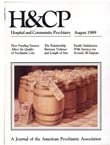Factors Predicting Utilization of Acute Psychiatric Inpatient Services by Frequently Hospitalized Patients
Abstract
A three-month cohort of admissions (N=300) to an acute psychiatric inpatient unit of a county general hospital was studied to identify factors that differentiate patients with multiple admissions over a 12-month period from those with only a single admission. Patients with more than one admission made up 32 percent of the cohort. Compared with single-admission patients, they were significantly more likely to be chronically unemployed and to have a diagnosis of schizophrenic or affective disorder. Regression analyses indicated that the number of prior psychiatric hospitalizations was the strongest predictor of both the number of hospitalizations and the number of days hospitalized; other significant predictors were a secondary diagnosis of personality disorder, chronic unemployment, self-referral, and being black. The findings indicate that many of the problems of multiple-admission patients are rooted in social disadvantage, and efforts to devise effective interventions should not focus on psychopathology alone.
Access content
To read the fulltext, please use one of the options below to sign in or purchase access.- Personal login
- Institutional Login
- Sign in via OpenAthens
- Register for access
-
Please login/register if you wish to pair your device and check access availability.
Not a subscriber?
PsychiatryOnline subscription options offer access to the DSM-5 library, books, journals, CME, and patient resources. This all-in-one virtual library provides psychiatrists and mental health professionals with key resources for diagnosis, treatment, research, and professional development.
Need more help? PsychiatryOnline Customer Service may be reached by emailing [email protected] or by calling 800-368-5777 (in the U.S.) or 703-907-7322 (outside the U.S.).



